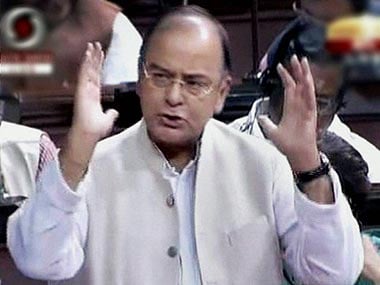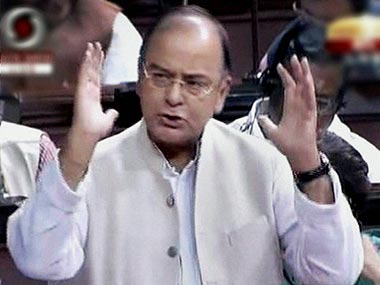On Thursday, the Lok Sabha rejected five amendments made by the Rajya Sabha while returning the Finance Bill. Among them was an amendment proposed by Sitaram Yechury on the clauses relating to political funding. Yechury said the provisions allowing corporates to donate any amount to a political party without disclosing the name of the political outfit would lead to a more opaque political funding era, an opinion other opposition parties too voiced. Rejecting this argument, Union Finance Minister Arun Jaitely said it didn’t make sense to insist that companies should disclose the name of the party since this will make them vulnerable to pressure from other political parties. He also extended an open invitation to the Opposition seeking suggestions on alternative ways to deal with the problem. “We felt the problem. Companies said if I disclose (the name of the party), another party will come and ask why I gave to this party (sic),” the minister said. Jaitley surely has a point, corporate donors can get caught in the crossfire of political parties, but these are not reasons to justify the opaqueness being institutionalized in the corporate funding of political parties. After all, total transparency in political funding is something that has topped the promises of the Narendra Modi government for long. It cannot get away with cosmetic changes that really don’t address the fundamental problem—corporate-political nexus. This is not to say that this government hasn’t taken steps to clean up political funding. It did a few things. First, the government proposed to ban all-cash donations above Rs 2,000 to political parties as against the earlier limit of Rs 20,000. Secondly, it asked donors to use cheque or electronic modes to make payments to political parties. Then came the proposal to create electoral bonds under which corporate donors can purchase these bonds and the money will go to the bank account of the particular party. All these were steps in the right direction. But, the story changed soon when it hurriedly amended the proposals in the Finance Bill, wherein it scrapped a ceiling that earlier restricted a corporate entity from donating more than 7. 5 percent of its average net profit in the three immediate preceding fiscal years to a political party. It also permitted companies not to disclose the name of the party to which it gives money in the company records. [caption id=“attachment_3242940” align=“alignleft” width=“380”]  Union Finance Minister Arun Jaitley. PTI[/caption] Effectively, these two last minute changes defeated the very purpose of ushering in absolute transparency in political funding. This surely gives room for certain possibilities, mainly the continuing existence of the secret world of corporate-political nexus. Logically, majority of corporate funding will be skewed in favour of the ruling political party since all companies want to be in the good books of the ruling party, whether it is BJP or the Congress party. This will further lead to conflict of interest since a company whose business requires participation in the government contracts can secretly put pressure on the government to act in its favour or twist policies by promising a fat donation. Not even the shareholders of the company will know where the money went. Similarly, a tainted company or corrupt promoter can influence the government by making a secret donation to the political party that runs the administration, a black money holder can do the same and one can’t even rule out money from an organisation which has terror links entering the coffers of a political party. Also, as certain opposition parties highlighted in the Finance Bill debate, opaque political funding can give room for creation of thousands of shell companies and for political extortion of companies. These are all likely scenarios in a world that thrives on greed, corruption and nepotism. Though an improvement, the Rs 2,000 cash donation rule still leaves big loopholes that can be exploited by wrongdoers. A political party can still misuse this rule to facilitate inflow of unaccounted money. It is just a matter of making more number of receipts. Cheques and electoral bonds are transparent means, but letting the company cover up the name of the beneficiary party while making payments through cheque or bonds make no sense and the government can claim no major progress as far as transparency in political funding is concerned. The fundamental point here is, if the government is indeed serious to bring about transparency in political funding, then it should bring in actual transparency (where everyone in the country knows who is funding whom) and do not settle for an opaque, useless clause in the interests of corporate donors. Remember, political parties’ primary commitment is to the general public, not corporate donors. Now, if it is a must that corporations cannot make political donations in a transparent manner, the government should then outrightly ban corporate political funding in the current format. Instead, it should encourage individual citizens, trusts or even companies to donate to political parties in a transparent manner by creating a state-fund managed by the Election Commission of India (ECI). This idea is something experts such as former chief election commissioner of India, SY Quraishi, have pointed out in the past. “State funding will free the parties from dependence on — and clutches of — the corporate houses who feel tempted to run the government by proxy,” Quraishi has proposed way back in 2015 in an op-ed piece. If necessary, Quraishi says, an Election Trust Fund could be created, to which corporations can make donations. The fund could be administered by an independent Trust or Election Commission. The allocation of funds will be based on the actual performance of parties, whose accounts will be audited by an independent auditor on the ECI approved panel or by CAG. The botomline is this: Beyond cosmetic changes, Modi-government has so far failed to make meaningful improvement in transparency when it comes to political funding. The promise of clean political funding remains largely a promise. Until every penny contributed to political parties is accounted for and open to public scrutiny, this will remain as a promise forever. If corporate money must remain opaque, let it go to a central fund managed by EC and not individual party coffers, which will further nurture corporate-political nexus.
Beyond cosmetic changes, Modi-government has so far failed to make meaningful improvement in transparency when it comes to political funding.
Advertisement
End of Article


)
)
)
)
)
)
)
)
)



